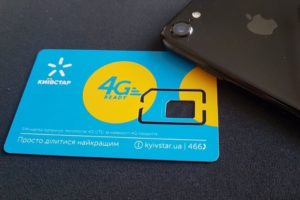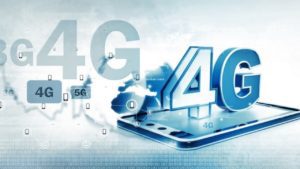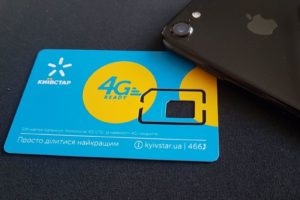
The cost of the launch of 4G mobile communication in Kyiv’s subway by three leading mobile communication operators Kyivstar, Vodafone Ukraine and lifecell is estimated at $20 million, Kyivstar President Alexander Komarov has said. “In the first quarter of 2020, we will launch the first stations if everything moves as it is now,” he told reporters at a briefing in Kyiv.
Kyivstar Chief Marketing Officer Pavel Daniman said that the project is equally funded by all three operators.
Komarov has connected great progress in the implementation of this project recently with the appointment of Maksym Bakhmatov as adviser to Kyiv Mayor Vitali Klitschko.
According to the president of Kyivstar, access to the municipal infrastructure remains a ‘narrow neck:’ for the project to start on schedule, the Kyiv Council still needs to approve telecom access tariffs.
Daniman said that the implementation of 2G and 4G communications will be carried out from the outer stations, as this is due to technology, and covering all stations will require some time due to the ability to work only a few hours at night.

The start of the 4G network in Kyiv subway is scheduled for the first quarter of 2020, advisor to Kyiv Mayor Maksym Bakhmatov said. According to him, in particular, it is planned to first connect the following subway stations in the 4G network: Akademmistechko, Zhytomyrska, Sviatoshyn, Nyvky, Heroiv Dnipra, Minska, Obolon, Syrets, and Dorohozhychi and Lukianivska, and at the end of 2020 or the beginning of 2021 to connect all stations and tunnels.
According to Bakhmatov, to date, negotiations have already been held and a common implementation scheme has been approved with the key mobile operators Vodafone Ukraine, Kyivstar and lifecell.
At the same time, he said that for the implementation of the project it is still necessary that the municipal enterprise Kyiv Metropoliten signs technical conditions, and the Kyiv City Council approves tariffs for telecom access to municipal transport facilities of the city. In addition, Huawei Ukraine needs to review the subway sites, develop and coordinate a working project for 4G implementation, conduct expert reviews by the relevant government services, and Kyiv Metropoliten and operators to prepare, coordinate and sign an access agreement, then sign a common document with Huawei Ukraine about the start of work.

The Kyivstar mobile communications operator has expanded the territory of coverage with 4G technology in 21 regions in Ukraine and connected 1,046 settlements to the new technologies, providing another 830,000 residents of Ukraine with access to high-speed Internet, the company has said in a report.
So, high-speed mobile Internet appeared in the cities and towns of Baturyn, Berdychiv, Bilovodsk, Varash, Volochysk, Volnyansk, Zolotonosha, Konotop, Manevychi, Mena, Radomyshl, Rubizhne, Sambir, Smila, Starokostiantyniv, Stryi, Khotyn, Schastia, Yampil, as well as several hundreds of villages.
To date, the Kyivstar 4G network operates in 7,885 settlements, 90% of which are located in rural areas. This is the territory where over 29.8 million people or 72% of the population of Ukraine live.
The operator has already installed about 7,500 towers for 4G communications.
The company also said that the operator supported a general plan of action aimed at implementing the decree of President of Ukraine Volodymyr Zelensky on ensuring nationwide coverage of 4G/LTE in the 900 MHz band.
Kyivstar is considering the possibility of becoming a “donor” of frequencies for other mobile operators, provided that the state takes measures to increase the efficiency of the radio frequency spectrum that Kyivstar may receive as a result of redistribution, the company said.

Kyivstar, a mobile operator, has connected 50 more settlements in Vinnytsia, Zhytomyr, Zakarpattia, Ivano-Frankivsk, Lviv and Khmelnytsky regions to the 4G network, the company’s press service has said.
Such an opportunity, in particular, appeared for subscribers in the settlements of Turbiv, Perehinske, Bilohirya, Hnezdychiv, Iziaslav, etc.
Kyivstar’s 4G network operates in 6,867 settlements, 90% of which are located in rural areas. The total number of residents in the territory of 4G accessibility is over 29 million people, or 70% of the population of Ukraine.
Over 7.5 million subscribers used 4G services in Kyivstar network.
Kyivstar is a Ukrainian telecommunications operator. It provides communications and data transmission services based on a wide range of mobile and fixed technologies, including 3G. At the end of 2018, its services were used by about 26.4 million mobile subscribers and about 900,000 fixed Internet customers.

The Big Three mobile operators (Kyivstar, Vodafone Ukraine and lifecell) have declared the Ukrainian subsidiary of the Chinese company Huawei the winner of the tender to find a contractor for the construction of a 4G network in Kyiv Metropoliten. “The contractor has been defined, it is Huawei. And we are awaiting the start of construction. The works are funded by the three mobile operators,” Kyivstar’s press service told Interfax-Ukraine.
At the same time, the press services of the operators refused to name the cost of work.
In October 2018, the Big Three operators began an independent tender for the supply of equipment and technical work on the transition to the 4G standard in the Kyiv subway.
4G, BUILD, HUAWEI, KYIV, METROPOLITEN

The Kyivstar mobile communications operator plans in 2019 to expand the 4G (LTE) mobile communication network, covering the territory of Ukraine where 75% of Ukrainian population lives, President of Kyivstar Alexander Komarov told reporters in Lviv on Saturday. “We invest a lot in expanding coverage, but we invest even more in coverage capacity in order to support the growing consumption trend,” he said.
Komarov recalled that in 2018, Kyivstar invested UAH 8.3 billion in the purchase of new frequencies and the construction of a network. “We covered 68% of the population in a year with LTE services. Our goal is 75% of the LTE population this year,” he said. The president of Kyivstar also said that in Lviv, the operator had begun a program on placing micro-sites (base towers) on city lighting and electric transport pylons in order to improve network coverage and capacity. “It is very modern and incredibly efficient. We still have problems with radiophobia and access to infrastructure, and such a solution plan with the support of the city and region helps us to solve fundamental problems of infrastructure development. We can build better coverage. We more often do not face homeowner associations, permissions,” he said.
Komarov said that the situation when the operator actually deals with one or two counterparties allows it to develop the network quickly, without spending a lot of time on negotiating documents or disputes on the placement of towers.
“No 5G revolution is possible without such solutions, because the development of 5G communication is an explosive growth in the number of micro-sites, especially in the heavily built-up areas,” Komarov said.
According to him, Kyivstar plans to scale the experience of placing microsites in Lviv and other areas, thereby solving the problem of access to urban infrastructure.
“In some areas, we are confronted with opposing phenomena – when, despite the actual availability of the law on access to infrastructure, it is still not implemented, operators cannot obtain permission to locate base towers in urban infrastructure,” Komarov said.
According to him, such illegal actions on the part of a number of public utilities and state-owned enterprises significantly hamper the development of the operators’ networks.